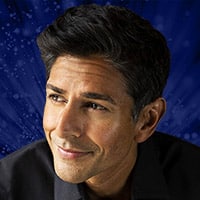The innovation theme weaved through several presentations on the second day of The Financial Brand Forum 2022 in Las Vegas.
In addition to keynote speakers like Yale Innovation Professor Duncan Wardle, and Suneel Gupta, Professor of Digital Strategy at Harvard, attendees packed into breakout sessions to hear insights from the likes of Forrester, Cornerstone Advisors and Fiserv.
Gupta, who focused on how to spark engagement and accelerate innovation, stressed the importance of giving employees a voice in proposed changes.
A common reason executives can’t bring about effective change is that when they take it to their employees, they’ve already put the whole plan together, he said. The new strategy, practice or product becomes an imposition.
He suggested sharing potential solutions when they are still under consideration. If employees have a chance to give their input, they are far more likely to buy into the final result.
Don’t discount that input either. Employees’ perspective is different than the leadership team’s, and they can point out potential hurdles that may not come up otherwise.
Read on for more key takeaways from The Forum 2022.

Navigating the Role of AI in Financial Institutions
83% of FI leaders agree investing in AI is essential for 2024 but how you leverage AI is instrumental in success and meeting customer expectations.
Read More about Navigating the Role of AI in Financial Institutions

Send the Right Offers to the Right Consumers
Achieve a better return on your marketing investment. Leverage behavioral data and analytics to target the right customers with the best possible offers.
Read More about Send the Right Offers to the Right Consumers
Give Employees Time to Think

DUNCAN WARDLE
Former head of innovation and creativity at Disney
The number one barrier to innovation in the workplace isn’t a lack of talent or the company culture. It’s that employees are so busy doing all the things they have to do that they “don’t have time to think,” says Duncan Wardle, formerly the head of innovation and creativity at Disney and now at Yale University.
Wardle advises banks and credit unions to set aside time to allow their employees to think about how to tackle challenges.
“Creativity is a muscle,” he says. “The more you use it, the stronger it gets.”
Get Serious About Digital Transformation

CHRIS SKINNER
Fintech legend and
best-selling author
The banking industry has been talking about digital transformation for over a decade, yet in many organizations it’s still on the do list, laments fintech guru Chris Skinner.
A key problem is that many banks and credit unions waste time and energy bolting digital faces onto creaking legacy infrastructure.
“Most financial institutions stick digital technology in front of analog systems. I call that ‘bankenstein,'” says Skinner, whose topic, “Building the Digital Bank of Tomorrow,” proved especially popular with attendees at The Forum. “It’s a lot of things just stitched together.”
While far too many traditional banks still muck about with such approaches, true digital transformation is already into its second generation of change, he says.
Skinner cites his favorite fintech as an example of the rapid evolution that’s bypassing so many traditional banks and credit unions. The payment company Stripe was founded by two teenagers on the strength of “seven beautiful lines of code,” he says. Though down from its peak valuation of $95 billion, the company remains a success.
“Banks understand accounting,” Skinner says. “They don’t understand code.”
Digitize, But Stay Human

HUNTER YOUNG
President of
HIFI Agency
As the head of a marketing firm dedicated to traditional banking providers and fintechs, Hunter Young is familiar with the pain points of digital transformation.
“Embracing a digital journey doesn’t mean instant efficiency,” says Young, the president of HIFI Agency. “There are no short cuts, and no software is a savior.”
He advises bank and credit union marketers to look for what he calls “intelligent solutions” that guide customers with empathy.
Manage Your Energy

SUNEEL GUPTA
Professor of digital strategy at Harvard University
Don’t manage your time if you want to succeed. Instead, manage your energy.
Otherwise, you risk burnout, warns Suneel Gupta, professor of digital strategy at Harvard University.
“People who are performing at the top of their game are taking eight breaks a day,” says Gupta, who suggests a “55 and 5” plan. That is, working for 55 minutes, then taking five minutes for yourself.
Go for a quick walk, do jumping jacks, play with your dog or crochet — choose any activity that you like. You’ll come back refreshed after that simple break. It’s a way to keep your energy up and your brain engaged.
On the other hand, a five-minute spell focused on a particular problem actually saves energy too, Gupta says. Many people keep shoving their problems to the back of the mental line. But they can’t forget them. They loom like vultures, sapping mental strength.
Get a five-minute sand timer, and pick a problem, Gupta advises. Devote just one turn of the timer to it, then move on. This provides mental ease and can help pinpoint a solution (whether immediately or eventually).
This strategy also can help you let go of the mind churning that happens when you keep replaying a problem on an endless loop.

Recruit Secret Shoppers

SUE WOODARD
Fintech evangelist and senior adviser to Total Expert
Retailers sometimes hire actors or recruit consumers as “secret shoppers” to visit their stores and report on their experiences. Was the merchandise displayed neatly? Were the clerks helpful? Were the bathrooms clean?
Financial institutions also can gain valuable insight by deploying secret shoppers, says Sue Woodard, a fintech evangelist and senior adviser to the software firm Total Expert.
She calls secret shopping an “experience experiment.”
“See what that tells you about how you can up level your own customer journey,” she says. “And I would also encourage you to evaluate what your technology stack can do for you.”







